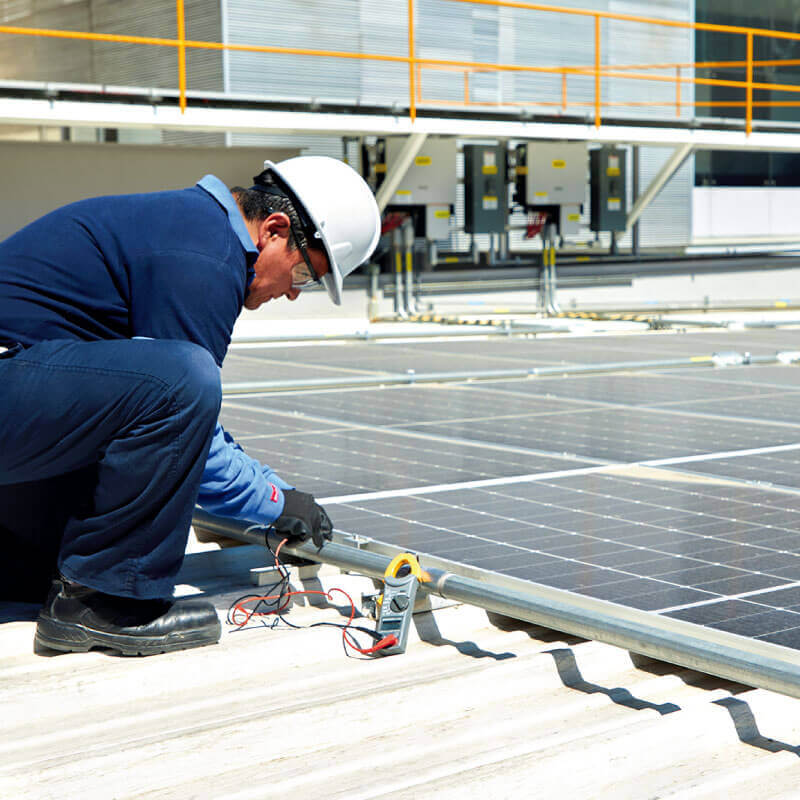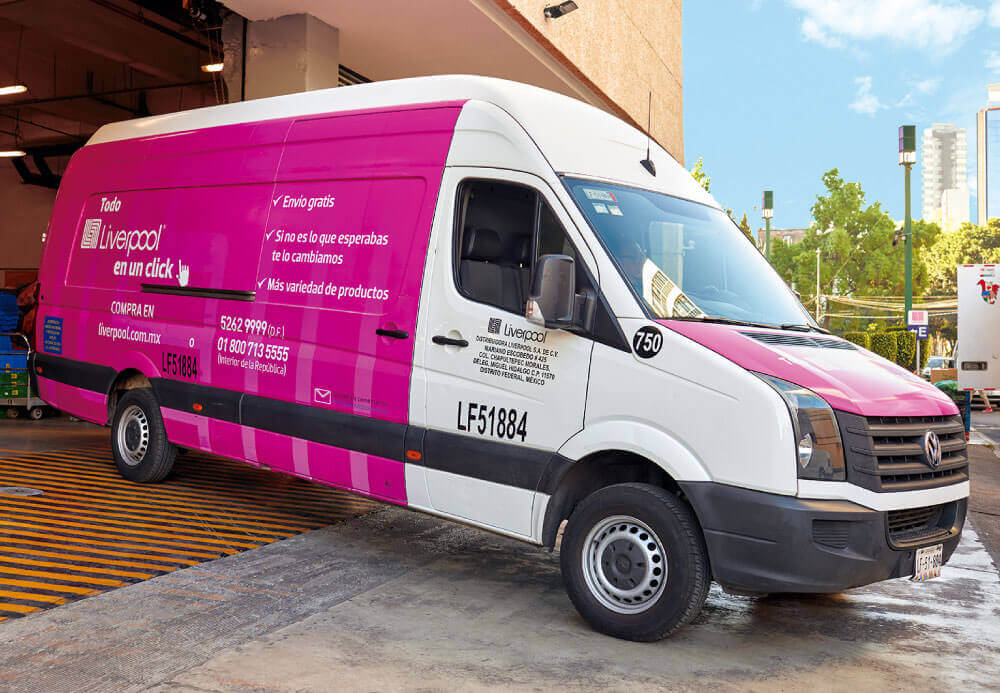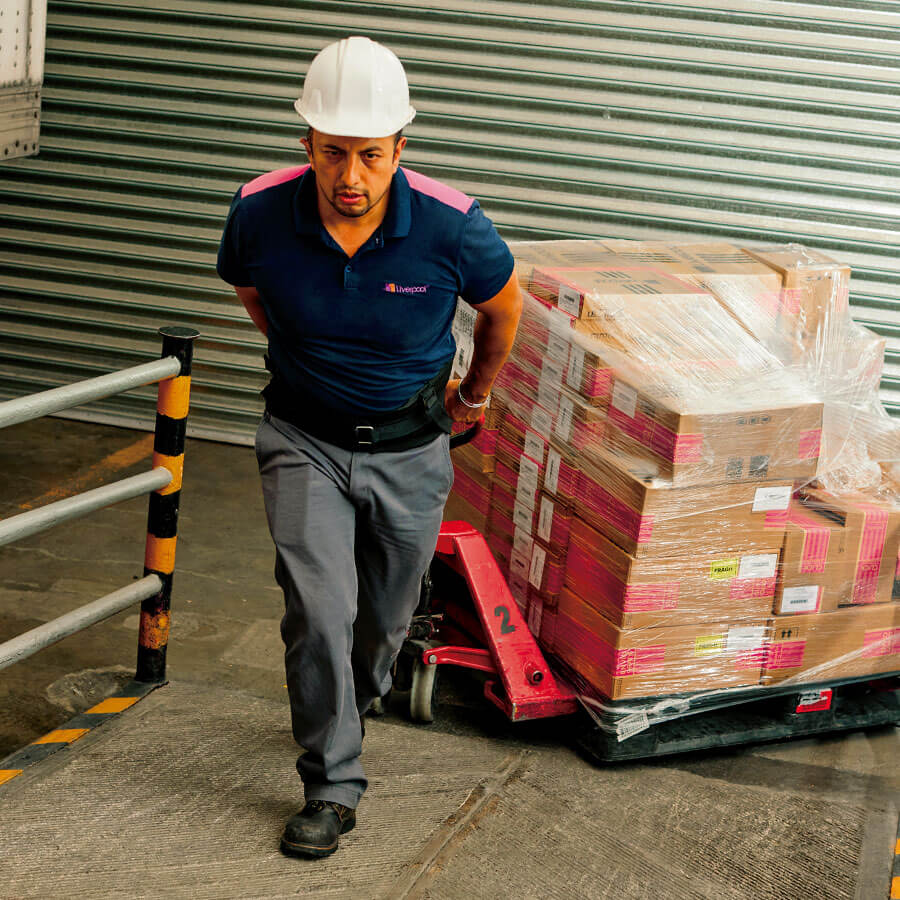Environmental dimension
| Achievements | |
|---|---|
| Environmental culture | Based on ISO 14001 international standard. |
| Energy and emissions | We invested in 50 more electric vehicles, bringing the total to 170 in our logistical fleet. |
| 39.21% of our energy comes from renewable sources. | |
| Process and waste circularity | 29.9% of our waste was recycled. |
| We meet SEDEMA provisions (and those of other state authorities) on circularity criteria in regulated containers. | |
| Water | We used 494,060.27m3 of treated water for sanitary facilities, washing parking lots, and others. |
Environmental management
At El Puerto de Liverpool, we are constantly working to improve our environmental
performance.We have taken steps to reduce our carbon footprint, efficiently manage waste
through recycling programs, promote reuse, and optimize water usage in our facilities.
We are strict about compliance and abide by all applicable environmental regulations.
In 2023, we drafted an environmental policy that promotes the incorporation of circular economy criteria, eco-efficiency, and reduction of greenhouse gas (GHG) emissions, which contribute to climate change, aiming to achieve carbon neutrality for direct emissions (Scope 1 and 2) by the year 2040.
We prioritize biodiversity conservation through environmental impact assessments and evaluations at all locations required by law. These processes identify the species of flora and fauna present and allow us to plan for appropriate ecosystem management.

of our energy comes from renewable sources

5.4 million digital tickets issued, practically 1.5 times our initial goal.
Energy and Emissions
(GRI 3-3, 302-1, 302-3, 302-4, 305-1, 305-2, 305-4, 305-5, CG-S-410 a.2)
All operation centers—administrative offices, warehouses, Liverpool stores, Suburbia stores, boutiques, and shopping centers (Galerías)—are governed by the Group’s proprietary environmental management system, based on ISO 14001 standard and audited internally.
We remain committed to optimizing energy consumption in our operations and reducing our GHG emissions. To achieve this, we focus our efforts on three main lines: low-impact mobility, energy efficiency, and energy source transition.
Low-impact mobility has become a key strategy for reducing emissions. At El Puerto de Liverpool, we have been gradually phasing out internal combustion vehicles and replacing them with hybrid and electric options. In 2023, we acquired 50 new electric vehicles. We are also making logistics more efficient using GPS technology to detect deviations and to improve route planning, driver safety, and cargo management.
To use more energy from renewable sources, we rely on wind, hydro, and solar energy from outside suppliers. Internally, we also continue to install solar panels. By the end of this year, we had 18 solar-powered locations, broken down as follows: 13 Liverpool stores, 1 Corporate Office, 2 Galerías Shopping Centers, and 2 Suburbia stores.

Process and waste circularity
(GRI 306-1, 306-2, 306-3, 306-4, 306-5)
A basic component of our strategy is the Comprehensive Sustainable Packaging System, by which we offer FSC-certified packaging. This seal attests to the responsible sourcing of materials, reduced packaging, efficient design, and safety throughout the lifecycle. We also offer packaging and containers with recycled, recyclable or biodegradable features. These initiatives are applied across the board in all our businesses to promote sustainable, responsible practices.
These efforts are supported by measures to correctly separate plastic wrapping, plastic bags, cardboard and PET in our facilities, which are in place at the Click & Collect areas in our Aguascalientes, Guanajuato, Michoacán and Querétaro stores. Special box collection containers have been installed at these sites where Customers can choose to leave the box for recycling or reuse it themselves, which also raises awareness about responsible waste management. In remote sales, we are improving the delivery experience for our Customers by selecting the correct packaging—appropriate to the dimensions of the product—at the time their order is sent.
We manage the waste generated in receiving areas, warehouses and loss prevention, administrative and maintenance areas, making sure it is handled correctly in each phase of the process. We trace our waste from generation, temporary storage, collection and transportation to final disposal, so that we can reuse and/or recycle not only the packaging materials discarded in warehouses, but also office, plant and restaurant waste such as toner cartridges, organic waste, and vegetable oil.
To dispose of our organic waste, we have nine strategically installed biodigesters that processed over 45 metric tons of organic waste in 2023. Finally, as part of our extended responsibility activities, we have launched a Customer-facing campaign to recover electronic waste.
Through this initiative, 32 permanent collection points have been set up in Liverpool and Suburbia stores where Customers and others can responsibly dispose of their electrical and electronic devices at the end of their useful life.
Another of our sustainable practice innovations has been our digital ticket strategy, under which we have issued over 5.4 million digital tickets, practically 1.5 times our initial goal. This proven initiative to reduce waste has also saved 80 thousand rolls of paper.
Water
(GRI 3-3, 303-1, 303-2, 303-3, 303-4)
In our commitment to more efficient water management, we strive to optimize reduction and seek out alternatives to supply our needs, such as treated water or rainwater. We intend to achieve water balance by the year 2040, and have begun a number of initiatives toward this end.
We had a study conducted at various locations to explore the possibility of using treated water, and in 2023 we ran a pilot test at Liverpool Puebla Serdán, to see if this could help us reduce the use of potable water.
We also have wastewater treated at our own and outside Wastewater Treatment Plants (WWTP), amounting to 454 thousand m3 of water. This is equivalent to 18.87% of our water consumption, used for watering green areas, in sanitary facilities, and the washing of parking lots.